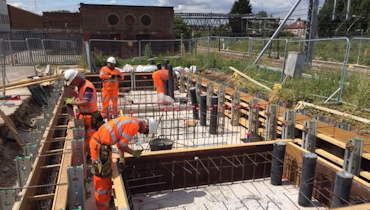Guest blog by Steve Sugden:
87% of construction employees surveyed felt the industry does not promote itself to young people.
There is an ongoing skills crisis, and 320,000 NEETs seek employment. Encouraging NEETs into construction needs a collaborative approach. Employers, supporting organisations and funding bodies should work together.
How do I know this?
Three years ago I returned to education as a very mature student, beginning a Masters in Construction Project Management.
It all started with an idea for a possible project which would make NEETs more attractive to construction employers. My wife suggested I do a Masters to support this. My first thought was “I can’t do a Masters, I’ve only got one CSE”!
That said, it got me thinking and so I started contacting universities, at first without success. Fortunately, a friend put me in contact with the University of the West of England, and after a few conversations around my previous experience, and a trial essay, I was accepted.
My focus was getting to the dissertation where I could explore my idea. But first there were the other eight modules to complete. I went in thinking I had a pretty good understanding of the industry, turns out this was not the case, I remember sitting in the first lecture and thinking “I’m not even sure I know what these words mean”. Two years of late nights, early mornings and most weekends sitting in the library, and I had completed the modules and was working on the dissertation.
I thought I knew exactly what I wanted to research but as it progressed the focus shifted away from the original idea. What become clear was that while there is a wealth of research into the barriers NEETs face, very little was specifically related to construction. It was also apparent that there was a lack of research into the barriers that can obstruct employers if they wish to engage with this group. This became the new focus of the dissertation.
The main research was through an online survey, with the option of follow up interviews. Lecturers suggested I should expect around 10 responses; 15 would be good. Thanks to the support of people like Ciara Pryce and VGC I ended up with over 50, the majority of which also contained reams of qualitative feedback, meaning follow-up interviews were not necessary.
Four broad areas to address
Analysing the feedback and linking to the literature review, I have identified four broad areas which need addressing if the industry is to improve engagement with NEETs. These are:
- The term NEET
- Construction recruitment practices
- Support for SMEs
- The perception and promotion of the industry
An abridged version of the conclusions is available, as well as the full version, broken into manageable chunks, on www.puentes.co.uk.
Positives from the research
 98% of the respondents felt construction was suitable for NEETs. Most of the factors that could indicate someone was at risk of becoming NEET were felt by industry to be supportable. Based on my previous experiences of working with NEETs, my assumption had been that construction was reluctant to employ them, so these responses were a pleasant surprise.
98% of the respondents felt construction was suitable for NEETs. Most of the factors that could indicate someone was at risk of becoming NEET were felt by industry to be supportable. Based on my previous experiences of working with NEETs, my assumption had been that construction was reluctant to employ them, so these responses were a pleasant surprise.
I also offered some suggestions on how barriers could be addressed, based on my own previous experiences. From the responses, I produced a possible full engagement programme.
My original idea – and the reason for beginning this journey – was, by a long way, the least popular option, so in a way I got the answer to my original question, if not the one I was hoping for.
The aim of the dissertation was to identify barriers and I hope to continue with this work, developing ideas that will support NEETs into the industry. This includes working with Building People to develop its ‘connecting people to opportunities platform’ to include dissertations and other research covering the breadth of the built environment, of which mine could be the first.
Addressing the construction skills crisis
The dissertation includes a review of the construction skills crisis. If the industry is serious about addressing this, then I suggest there needs to be change.
- Improving the perceptions of the industry, promoting it, developing methods to support SMEs to engage with underrepresented groups, and challenging recruitment practices
- Clarification of who NEETs really are is needed, the term itself being incredibly negative. It implies they are in that position because they are not doing something, but ignoring the why.
Reviewing practices will not just support NEETs, but also other underrepresented groups, into the industry. This has to be a good thing.
Quite pleased
Last Friday I attended my graduation at Bristol Cathedral. I’m now a Master of Science with Distinction. I’m quite pleased with that.

I am more than happy to discuss further if people are interested, and welcome any feedback. You can contact me at steve.sugden@me.com .
